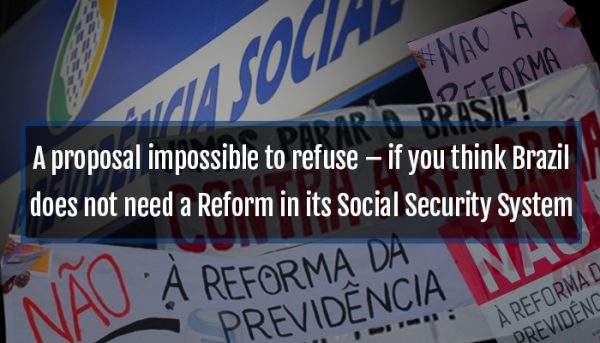08/2017
By Ricardo Amorim

The main arguments by those who think there is no need for a Reform in the Brazilian Social Security System usually are:
1 – there is no deficit in the system; rather, there is a surplus;
2 – the problems are: corruption in companies’ debts and the DRU,
3 – Federal, State and Municipal public servants do deserve to retire a lot earlier and be paid larger benefits than workers in the private sector because their contributions to the System are higher than those of other workers.
4 – The only problem are the mega-pensions paid to politicians, judges and Public Ministry.
I have a proposal impossible to refuse for people who believe in the arguments above:
First, we collect each cent owed by the corporate sector. Then we eliminate the DRU. Next we put an end to mega-pensions for politicians, judges and the Public Ministry, submitting them to the rules of the INSS. We then add up all the revenue and check the total collection. Finally, since the Social Security system would have a surplus and the contributions would be compatible with the benefits, we redefine the benefit to be shared, making it proportional to each one’s contribution. This would then be fair – each participant paid in accordance with his contribution – the benefits would supposedly grow – because the alleged surplus would make for an increase in benefits – and the Social Security accounts would be in perfect balance.
Agree? If you really believe in the 4 arguments above, you simply must agree. This would be a win-win…If not, you must admit the 4 arguments are false.
There is no problem in being against the Social Security Reform and yet recognize that in fact the System has a deficit that grows nonstop and which will be close to R$ 400 billion this year, that the corporate world debt must be collected in full but it won’t even tickle the deficit, that the DRU not only does not drain funds from Social Security but also finances its deficit, that the contribution paid by public servants and the military does not come close to funding the excessively generous benefits they receive, and the hole relative to the public sector in the Social Security budget goes far beyond judges, politicians and the Public Ministry. In this case, however, you must also admit that it is fair to annually funnel to Social Security more than R$ 400 billion which should have gone to Health, Education, etc, topping up actual contributions to guarantee that current benefits be maintained, Nothing wrong with that, though I fully disagree. It is just not possible to ground the discussion on lies.
For those who accept this reform and is curious about what would happen to benefits, lets move to figures. The first Social Security regime in Brazil dates back to 1.888, but the “Social Security General Regulation” was only approved in 1960. In the 57 years since then, companies accumulated a total debt of R$ 433 billion with Social Security, including fines, monetary correction and interest. Had this debt been paid in full along the last 57 years and the annual collection would have been R$7,5 billion more. There isn’t the slightest chance, in practice, that this debt shall be honoured in full, because R$ 251 billion refer to the debt of bankrupt companies, but if we were to suppose that the debt shall be entirely paid along the same period it took to become due, the annual INSS collection would be R$ 7.5 billion higher from now on.
The DRU, on the other hand, not only did not drain funds from the Security System but also earmarked R$ 167 billion of the Federal Budget to Social Security. A few examples of investment cuts made in 2017 to cover pension benefits higher than the contributions: R$ 11 billion less for infrastructure, R$ 6 billion less for Health, R$ 5 billion less for Education and R$ 6 billion less for Transportation. Without the DRU, these funds would not go to Social Security and would return to where they came from. From then on, the INSS would only be able to pay what it collects. The deficit would have to be eliminated by immediately reducing the benefits of retirees and everyone due to retire from now on, down to what the system could afford.
In the case of the INSS, collection this year will be R$ 372 billion. Adding to that the payment of the corporate debt, if paid, it would come to R$ 380 billion. The expense forecast is R$ 561 billion. To equate that to R$ 380 billion, the benefits the INSS pays out would have to be reduced by 32% in average.
In the case of public servants the drop in benefits would be much greater. In the case of civilian federal servants collection this year will be R$ 36 billion and disbursement will be R$ 71 billion. Without the funds coming via the DRU the benefits would have to be cut in half. Of the R$ 35 billion deficit, R$ 3.6 billion come from the Legislative, R$ 8.6 billion from the Judiciary, R$ 0.6 billion from the Public Ministry and another R$ 22 billion from the other public servants. It is therefore essential to adapt retirement rules for politicians, judges and the Public Ministry – but that won’t spare the other public servants from having their own rules matched to the reality of collection.
In the case of the military, collection is R$ 2 billion and R$ 40 billion are paid out. Without the DRU their benefits would be 95% less.
As to public servants in the States and Municipalities, the deficit this year is estimated to be around R$ 100 billion. If payments out are limited to collection, benefits would drop 43% in average, but with huge disparities. In some States, like Minas Gerais, Rio Grande do Sul and Rio de Janeiro, benefits paid would have to be reduced by much more than 50%.
Social assistance – to those who are paid without ever having contributed – spends R$53 billion annually, and would have to be extinguished if there were no DRU, because it has no source of income of its own.
In all cases, without changes in the rules applied to length of time or the amount of contribution, benefits would drop year on year because for demographic reasons – growth in life expectancy and drop in the birth rate – the number of retirees grows faster than the number of workers financing the system. Consequently the growth in the Security System revenue will be less than the growth in the number of beneficiaries, requiring persistent reduction in the benefits paid out.
In short, you may be against reforming the Social Security System – increasing time of contribution and reducing a little the distortion in the contribution/benefit rules – but then you must admit that you think fair to pull out more than R$ 400 billion a year from Health, Education, Infrastructure, Public Security, etc., in order for the Social Security System to pay pensions above what it can afford with its own collection.
Ricardo Amorim is the author of the best-seller After the Storm, a host of Manhattan Connection at Globonews, the most influential economist in Brazil according to Forbes Magazine, the most influential Brazilian on LinkedIn, the only Brazilian among the best world lecturers at Speakers Corner and the winner of the “Most Admired in the Economy, Business and Finance Press”.
Click here and view Ricardo’s lectures.
Follow me on: Facebook, Twitter, YouTube, Instagram e Medium.
Translation: Simone Montgomery Troula




